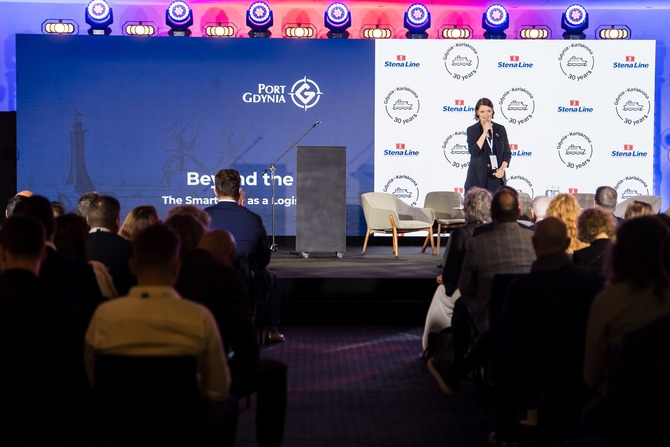Three decades on the Baltic Sea – Stena Line connects Gdynia and Karlskrona for 30 years
In May 2025, 30 years has passed since Stena Line launched ferry service between Gdynia and Karlskrona. The line has become a key maritime corridor that has carried more than 12 million passengers and 2.5 million freight units.

Katarzyna Gruszecka-Spychała at the 30th anniversary of Stena Line Poland. Source: Stena Line's press release
The 30th anniversary of Stena Line's ferry service between Gdynia and Karlskrona is not only an important anniversary for the company, but also a symbol of long-term Polish-Swedish cooperation, developing parallel to the changes in Europe and the transport market. The culmination of the celebrations anniversary was the Stena Line Baltic Business Conference Gdynia 2025, with the participation of many distinguished guests, representing the shipping, economic, logistics and administration. The event was attended by, among others, Dan Olsson - owner of Stena Sphere, Niclas Mårtensson - CEO of Stena Line Group, Marek Kiersnowski - managing director of Stena Line Poland, Ignacy Morawski, chief economist of Puls Biznesu, as well as industry representatives: Fredrik Udd (Explore Markets), Ron Gerlach (technical director at Stena Technik), Bogdan Oldakowski (CEO of Actia Forum), Malgorzata Musinska-Kubis (Global Category Manager for Logistics & Transport at Qemetica Group), Katarzyna GruszeckaSpychała (Vice President of the Port of Gdynia Authority). Also present was the Ambassador of Sweden in Poland, Andreas von Beckerath.
The past – building the line from the scratch
When the first Lion Queen ferry sailed from Karlskrona to Gdynia in May 1995, it was a bold step - an attempt to create a new sea route almost from scratch. On its first voyage the ship took single units of freight, but soon the connection began to gain importance. Already in 1997, a new, larger ferry, the Stena Europe, entered the route, making it possible to handle the growing number of passengers and cargo.
Over time, the line has become increasingly important economically and logistically - especially after the Poland's entry into the European Union in 2004. Investments in promotional campaigns successfully attracted passengers and logistic companies from both countries.
“From the beginning we treated the Gdynia-Karlskrona line as a long-term investment project. We built the route from scratch, developing it consistently over 30 years. Today it is a stable, sustainable business - we have served more than 12 million passengers and 2.5 million freight units, making it one of the most important ferry connections in the Baltic Sea and an important link in the European logistics system,” stresses Marek Kiersnowski, managing director of Stena Line Poland.
Today – modern fleet and infrastructure
In June 2022, Stena Line's ferry operations moved to a new, modern terminal in Gdynia. The facility allows ferry operations with a length of 240 meters and offers a direct connection to the rail network, which will enable the development of intermodal transport in the future.
The line is currently served by three vessels: Stena Spirit and modern e-flexer ferries – Stena Estelle and Stena Ebba. Each can carry 1,200 passengers and 200 trucks, and their energy-efficient design allows them to use shore power, reducing emissions of CO2. They are the highest quality ferries in Stena Line's entire fleet.
The future – the bridge between Scandinavia and Central Europe
After 30 years of uninterrupted presence on the Baltic Sea, Stena Line does not intend to slow down. The future of the Gdynia-Karlskrona line includes further investments in freight development, automation and technologies that reduce CO2 emissions. New ferries are already being adapted to run on LNG and methanol, and in the future it will be possible to convert them to hybrid propulsion using batteries.
The Gdynia-Karlskrona connection is now a strategic part of the 6th TEN-T corridor, connecting the Baltic Sea to the Adriatic, and thus Scandinavia to Central and Southern Europe. For the company, this is not only a commercial success, but also a responsibility. In an era of geopolitical changes and the energy transition, the military and social importance of the and social importance of this route.
“Our investments in tonnage and port infrastructure are a clear sign that we believe in the in the future of this link. Today, routes such as this one have a dual importance - as elements of the logistics system, but also potential military corridors. Stena Line is not just a carrier - it is a trusted link between people, places and societies,” says Marek Kiersnowski, managing director of Stena Line Poland.
In a challenging world, Stena Line's answer is reliability, safety and sustainability - values that define not only its present, but above all, set the direction for the future. Today, 30 years after the first voyage, Gdynia-Karlskrona connection is not only a symbol of cooperation between the two ports, but also a proof that responsible investments and strategic decisions can create something lasting - now, and for many years to come.
Source:
[Stena Line’s press release]

